

Promising signs of new life on Australia's largest oceanic reef, despite frequent heat stress. A research trip to Australia's largest oceanic reef system has shown promising signs of new life, following the 2016 mass bleaching event, which impacted coral reefs all over the globe.
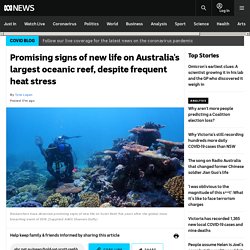
Key points: Scientists say Scott Reef is slowly recovering after the 2016 mass bleaching eventThey have concerns about frequent heatwaves impeding the overall recovery of the reefThe findings reflect a pattern around the country But unlike mass bleaching events of the past, scientists are concerned Scott Reef is facing a barrier to its recovery.
Coral ecology research scientist James Gilmour, from the Australian Institute of Marine Science, said repeated, smaller marine heatwaves since the 2016 event were compounding bleaching impacts. "We're getting this recurrent heating and stress to the reefs which obviously are going to impede its recovery. "We see this overlying resilience, but the effects of ongoing heat stress impeding that. " New research shows one third of Australia's threatened birds have become endangered over past decade. At sunset on Darwin's Lee Point Beach, thousands of shorebirds crowd together at the high tide line, and swirl up into a coordinated dance across the sky when disturbed.
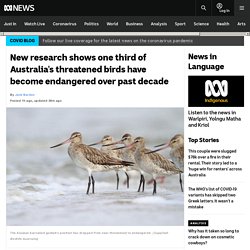
A third of Australia's most threatened species have declined furtherMigratory shorebirds are losing feeding habitats all along their migration routesClimate change is reducing numbers of tropical species, scientists say "There's often 10, 15, species in a flock like this," Charles Darwin University Professor of Conservation Stephen Garnett said. "We can see red-necked stint, ruddy turnstone, greater and lesser sand plover, great knots, red knots, sanderling, there's whimbrel and godwit. " But he said the large numbers of migratory birds, which roost here at this time of year, belie big drops in their populations globally. Shorebirds including the curlew sandpiper, ruddy turnstone, sharp-tailed sandpiper and common greenshank and grey plover are among birds that have sharply declined.
Lost Eurasian hobby flies into history books as first of his kind in eastern Australia. A rare European bird of prey has been found for the first time in eastern Australia — and researchers say its unprecedented journey could be the result of a changing climate.

Key points: A Eurasian hobby has been found in eastern Australia for the first time in recorded historyThe small falcon, named Hubert, has a fractured wing and will soon undergo surgeryResearchers say environmental factors could have influenced the bird's journey from Europe to south-east Australia The Eurasian hobby has only been seen in Australia five times in recorded history, with all sightings having occurred near Perth over the past five years. The small falcons normally migrate from Europe south to Asia and Africa, but this male, dubbed Hubert for his "lovely, quiet nature", was found wandering around on foot in a paddock in Sale, in Victoria's south-east.
Wildlife carer Linda Cunningham was the first responder on the scene. Amazon deforestation is stopping forest from recycling rainwater, which affects temperatures. For 55 million years, heavy rain has brought life and splendour to the Amazon rainforest.
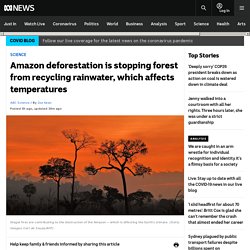
But a rapid increase in deforestation is threatening the very water systems that make the forest … well, a rainforest. Key points: Experts have stressed the impact the Amazon has on global temperaturesClear-cutting of the rainforest continued to rise last year, with over 11,000 square km of rainforest lostBrazil has joined an international pledge to halt and reverse deforestation by 2030, surprising many observers The destruction of the Amazon threatens water security, both in the rainforest itself, and further south in more temperate climes. New study shows events like Sydney's March 2021 floods could be 80 per cent more likely by end of the century. After a thoroughly soggy week, a new paper confirms this kind of thing is expected to become more likely as the climate warms.
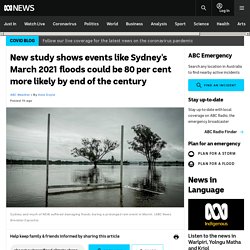
Key points: A new study has found events like those that led to flooding in Sydney in March could become 80 per cent more likely by 2100 under moderate and high emissions scenariosAs temperatures warm, the atmosphere's water holding capacity increases so when it rains we get more rainfallThis means flooding is something we are likely to have to deal with more often What will this mean for low-lying areas and how do we make our communities more resilient to flooding? PhD student Kimberley Reid studies atmospheric rivers, a emotive name for a narrow region of strong water vapour that streams through the atmosphere. These atmospheric rivers allow moisture to flow around the world, and are often associated with heavy rain and floods. A father and son's Ice Age plot to slow Siberian permafrost thaw. In one of the planet's coldest places, 130 kilometres south of Russia's Arctic coast, scientist Sergey Zimov can find no sign of permafrost as global warming permeates Siberia's soil.
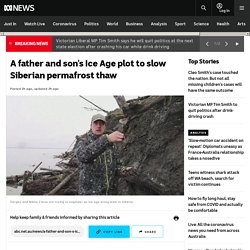
As everything from mammoth bones to ancient vegetation frozen inside it for millennia thaws and decomposes, it now threatens to release vast amounts of greenhouse gases. Zimov, who has studied permafrost from his scientific base in the diamond-producing Yakutia region for decades, is seeing the effects of climate change in real time. Driving a thin metal pole metres into the Siberian turf, where temperatures are rising at more than three times the world average, with barely any force, the 66-year-old is matter-of-fact. "This is one of the coldest places on earth and there is no permafrost," he says. "Methane has never increased in the atmosphere at the speed it is today … I think this is linked to our permafrost.
" Climate change now. Summer temperatures are soaring, those burnt out in the Black Summer are rebuilding, and water flows have been down for decades.
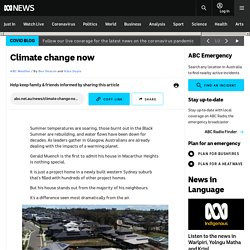
As leaders gather in Glasgow, Australians are already dealing with the impacts of a warming planet. Gerald Muench is the first to admit his house in Macarthur Heights is nothing special. It is just a project home in a newly built western Sydney suburb that's filled with hundreds of other project homes. Gina Rinehart says polar bear numbers have increased. Is that correct? The claim Mining magnate Gina Rinehart does not give many public speeches.

But video of a recent address given to St Hilda's Anglican School for Girls, Mrs Rinehart's Perth alma mater, was leaked to the media, and revealed much about some of the opinions of Australia's richest woman. Mrs Rinehart warned against "propaganda" taught in schools, giving the example of former US vice president Al Gore's film on the subject of climate change, An Inconvenient Truth. "I'd heard that senior school students in a previous headmistress's time, were having to watch … An Inconvenient Truth. Catchy title, but sadly short on delivery as far as truth is concerned, e.g. the sad loss of polar bears, when actually their numbers have increased," Mrs Rinehart said. Have polar bear numbers increased? The verdict. This 'extreme conservationist' dressed as a polar bear to understand the effects of climate change. Around the world, many different people are helping to fight climate change in many different ways.
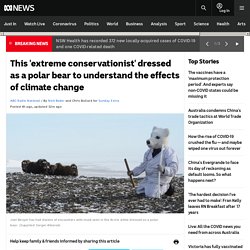
For Joel Berger, this has involved dressing up as a polar bear and being charged by native wildlife in the frozen reaches of northeast Russia. Professor Berger, a conservation biologist with Colorado State University and the Wildlife Conservation Society, calls himself an "extreme conservationist. " Why climate change is making autumn shorter. As the jacaranda trees bloom here in Australia, the autumn leaves fall in the northern hemisphere and revellers across the US take to nature for the annual pastime of "leaf peeping".
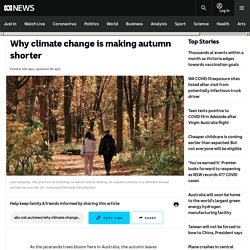
Autumn in the US usually reaches its peak at the end of SeptemberForest rangers in lush forest region Maine say a third of trees are yet to change colourHotter, drier conditions are causing leaf stress, which impacts the colour-changing process But this culturally significant marker of the passage of time is in serious danger of disappearing. Recent autumn seasons have been disrupted by weather conditions and the trend is likely to continue as the planet warms, widely concerning arborists, conservationists and ecologists. Typically, by the end of September, leaves have cascaded into warmer hues throughout the US. This year, however, many areas have yet to even pivot from their summer green shades. "Instead of trees doing this gradual change, they get thrown these wacky weather events. Research seeks to determine how much extra carbon dioxide can trees absorb to reduce greenhouse emissions.
As greenhouse gas levels rise globally, just how much extra carbon dioxide can trees absorb? Key points: Research in the UK shows old oak trees could photosynthesise 30 per cent more CO2 as levels rise It is the world's largest experiment looking at the effect of climate change on natureIt is still not clear where trees store the CO2 and for how long That is the question scientists in Australia, and the United Kingdom have been trying to answer. Gardeners, walkers and citizen scientists join nature data quest. Many gardeners keenly observe the seasons watching the lifecycles of plants and animals for a sign about what's next — and meticulously record their findings. Now, in the era of increased awareness about climate change, these observations are becoming useful. John Ditchburn began his garden in 1989, behind an old weatherboard house on an unusually large plot which was once a miner's lease close to Ballarat's centre.
"I very quickly realised [the block] was probably too big — it wasn't space that was the problem, it was time," Mr Ditchburn says. And over the decades gardening has devoured his time. He's grown vegetables and fruit trees, kept chooks, bred fish, and tended to his compost heap. He has also spent years creating and updating region specific vegetable growing guides. When he started his guides, he interviewed older gardeners in his neighbourhood, and he started keeping records. Space to play or pause, M to mute, left and right arrows to seek, up and down arrows for volume. Coral bleaching extent shown in new study, with WA reefs suffering more than Great Barrier Reef.
A major analysis of global coral reef health has raised concern about the frequency of bleaching events in Western Australia. Key points: A study has revealed the rate at which WA reefs are being bleachedIt points to climate change as the main cause of coral bleachingThe report includes data from 73 different countries The report, released this week by the Global Coral Reef Monitoring Network, showed the state had experienced more coral bleaching in recent decades than the Great Barrier Reef. It is understood to be the largest quantitative analysis of coral reef health ever undertaken. The report's editor and chief research officer at the Australian Institute of Marine Science (AIMS), David Souter, said the recovery of reefs after these events — something that usually took a decade — was being hindered.
The report included data from 73 countries and found that since 2010, almost all regions suffered a decline of average coral cover. Great Barrier Reef struggles to recover Hope yet for reefs. Link between native forest logging and bushfires prompts calls for rethink of forest management. There is growing pressure on the Tasmanian government to rethink its native forest management practices, after new University of Tasmania research found regenerating forests are more prone to high-severity bushfires than mature forests. Key points: A University of Tasmania study has found younger forests have a higher bushfire risk than mature forestsSimilar research in Victoria found logged and regenerated forests were more likely to burn at higher severityThere are calls for new forest management techniques to increase resilience to bushfires in the wake of climate change The study focused on Tasmanian eucalyptus forest, aiming to assess how fire danger changes as forests mature, to help predict bushfire behaviour.
Wildfire ecologist James Furlaud said the study found fire risk in older forests was much lower than in young forests, and clear-felling — the practice of removing all trees from a coupe — could increase fire risk. Calls for new forest management practices. Charlie Veron's 'coral ark' biobank plan to futureproof the Great Barrier Reef.
Charlie Veron is practically a human fish. He would never come to the surface if he didn't run out of oxygen. He would live down there in an underwater garden at one with the fish and the other busy marine life. Dr Veron has spent the past 50 years diving around coral reefs, observing, absorbing, enveloped by nature, at home in some of the most remote places on Earth. And every single time he dives, "I see stuff I have never seen before. It is unending. " Australian Antarctic Division prepares to drill million-year-old ice core to understand ice age shift. Allana Brown fears if the NT's gas emissions are not offset there is no future for her baby. Many carbon credits for deforestation could be 'nothing more than hot air', report finds.
Every year Australian governments and businesses spend millions of dollars on carbon credits to reduce greenhouse gas emissions. You may have even paid to offset emissions yourself when booking a flight. A line in the sand. Environment Minister approves Vickery coal mine extension after teenagers' climate change legal challenge. Federal Environment Minister Sussan Ley has approved the extension of a north-west NSW coal mine, after it was the subject of a legal challenge by a group of teenagers. Key points: The federal government said the mine extension approval followed a rigorous assessment processTeenagers involved in the climate change legal battle said the minister should be "ashamed" Earlier this year a Federal Court justice said approving the mine would cause a "small but foreseeable" impact on climate change The approval of Whitehaven Coal's Vickery Extension Project came after the Federal Court ruled the minister had a duty to consider the potential harms for young people from climate change when considering fossil fuel projects.
Doctors, farmers call on federal government to adopt stronger climate targets ahead of Glasgow summit. Shape-shifting animals tell the story of climate change, review finds. Climate change is having a direct impact on the bodies of animals, causing their shapes to transform. Ozone recovery is offsetting Southern Hemisphere climate change trends in summer. If the latest climate report from the Intergovernmental Panel on Climate Change (IPCC) made anything clear, it was that much more needs to be done to reverse the impacts of climate change.
Goats on frontline of bushfire-prevention efforts in parts of New South Wales. Goats have a reputation for eating everything in sight and that is why they are being deployed to help protect New South Wales from future bushfires. Winter, spring rains drive increased grassfire potential in Australia's eastern states. Bushfires are more likely this spring, all the way from western Victoria to Townsville, according to the annual Seasonal Bushfire Outlook, Spring 2021. Hungry tropical fish, sea urchins marching south as kelp forests disappear. Greenland rainfall has scientists worried about melting ice caps. Research confirms there is not enough water to meet the requirements of the Murray-Darling Basin Plan. Woodside's BHP oil and gas deal promises short-term gain, but is it signing up for long-term pain? Greece's wildfires may be dying down on the island of Evia, but white-hot anger rises in its place.
Central Land Council survey finds 29 sacred sites could be threatened by Singleton Station water licence. What does the latest IPCC report mean for Australia? Climate emergency not slowed by COVID-19 pandemic and planet's 'vital signs' worsening, scientists say. Australia avoids Great Barrier Reef global embarrassment, but the dangers of climate change remain for the reef. These electorates have the highest climate risk. So why are they less likely to demand more action?
Great Barrier Reef still at risk despite huge spend to improve water quality runoff. 'Super' heat tolerant kelp restores hope for underwater forests battling climate change. Environment Minister says government will challenge UNESCO move to list Great Barrier Reef as 'in danger' How the next 5 years can buy us a decade to solve climate change. Fears Antarctic glacier could melt faster as it speeds up and ice shelf 'rips apart'
Salt erosion increasingly decaying cave paintings believed to be world's oldest. Sea of Marmara algal bloom, dubbed 'sea snot', alarming Turkish scientists and fishermen. RV Investigator marks end of weeks-long voyage studying impacts of warming East Australian Current. CSIRO predicts more drought, drastic drop in Murray-Darling basin water. World's biggest iceberg, dubbed A-76, spotted by satellite after calving from Antarctica. Butterfly boom takes flight in north Queensland under perfect weather conditions. Former ADF official says increasing climate-related weather events could overwhelm defence force. For these Torres Strait Islanders, climate change is already here — and they're urging the government to do more. Energy efficiency rules considered for Northern Territory buildings, years after other states.
Big surf flips boulders across road in Port Fairy, reigniting climate change, coastal erosion concerns. Carbon dioxide levels reach historic high as Joe Biden calls world leaders to climate talks. Infrastructure Victoria panel calls for end of new petrol car sales, amid slow take-up of electric vehicles. Narooma on NSW south coast revealed as a hot spot for global ocean warming. Scientists studying krill want to know how the tiny crustaceans are affected by climate change and fishing. Satellites capture formation of enormous iceberg A74 on Antarctica's Brunt Ice Shelf - ABC News (Australian Broadcasting Corporation)
Family honoured for 100 years of service to Bureau of Meteorology say past 10 years one of the driest. The tragedy of Tasmania's underwater kelp forests - Science. FOI documents show Darwin's $2.7m shade structure reduces heat by less than 1C. NSW Irrigators' Council calls for honest conversation as its research shows inflows to river systems have halved. Victoria's heatwave weather conditions spark most significant fire risk this season. Researchers rejoice at rediscovery of tiny Tasmanian crayfish thought to be extinct. Climate change pushed ocean temperatures to record high in 2020, study finds. Meet the creepy critters of the Southern Ocean's 'twilight zone' Bushfires help Christmas bells thrive, study says, but climate change could threaten their future.
Commonwealth tips another $173 million into Beetaloo Basin gas reserve, insists emissions targets on track. Rising sea levels visibly transforming parts of coastal region around Kakadu National Park. Baby shark study reveals impacts of climate change on Great Barrier Reef species. As the Arctic melts, scientists say a regime shift is taking place - ABC News (Australian Broadcasting Corporation) 2020 equals world's hottest year on record, as factors behind Black Summer become clearer. 2020 ties with 2016 as world's hottest year on record, EU climate change service. Hundreds of Pacific Islands are getting bigger despite global warming. Port Fairy's migratory short-tailed shearwaters rally after mass deaths halve colony. From bushfires to flash flooding, what will the Australian summer of the future look like?
Burrunan dolphin deaths linked to Fresh Water Skin Disease caused by climate change. Inland New South Wales rivers may never recover from the last drought, expert warns. Australian 'super seaweed' supplement to reduce cattle gas emissions wins $1m international prize. Cruise ships could revive Queensland tourism, but how will they impact its environment? - ABC News.
Scott Morrison to be pressured by Pacific leaders at climate change summit led by United Nations - ABC News. The Midnight Sky: George Clooney's first Netflix film is a post-apocalyptic sci-fi drama - ABC News. Zebra finches' ingenious 'vocal panting' cools them down and signals hot weather to embryos - ABC News. UNESCO conservation advisory IUCN elevates concern for World Heritage Gondwana rainforests - ABC News. This tropical glacier is rare, revered, and could be gone by next year - ABC News. Great Barrier Reef outlook worsens to 'critical' as climate change named number one threat to world heritage sites - ABC News. Tim Flannery warns of adverse climate impacts if South32 coal mine expansion approved - ABC News. Scientists race to find wild, ancient bananas to save the popular fruit from climate change - ABC News. BOM and CSIRO State of the Climate 2020 shows Australia is experiencing climate change now - ABC News.
Bushfire royal commission's final report issues warning to Australia over climate change - ABC News. Queensland teenagers lodge legal action against Adani coal mine to save Great Barrier Reef - ABC News. In Donald Trump country, Kathy has lost eight cars to rising tides caused by climate change. But it won't impact her vote in the US election - ABC News. Great Barrier Reef coral halved by bleaching, climate change, report finds - ABC News. Greenland ice sheet loss already 'unprecedented' and set to accelerate - ABC News. Queensland government approval of Olive Downs Coking Coal Project criticised by conservation groups - ABC News. Climate change blamed as Arctic Ocean ice cover shrinks to second-lowest level on record - ABC News.
Greenland glacier loses 110 square kilometres' worth of ice - ABC News. NT business groups warn Gunner Government against chasing 'fanciful' economic recovery projects - ABC News. Australia amid climate change is making migrants adapt again. Satellite imagery reveals, in precise detail, extent of NSW bushfire destruction across Black Summer - ABC News. Greenland's ice sheet melted away at record levels in 2019, scientists fear it will continue - ABC News.
Cider gums under threat from fire, foraging and global warming, conservationists warn - ABC News. How coastal communities on Victoria's Bellarine Peninsula are dealing with the reality of sea level rises - ABC News.